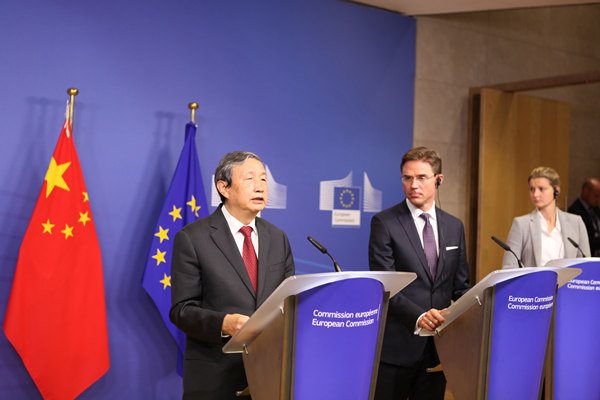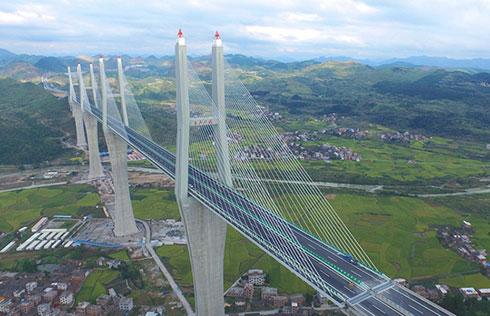European Commission to address WTO accession protocol
By FU JING in Brussels ( chinadaily.com.cn ) Updated: 2016-10-18 15:57:44The European Commission will propose an "entire package" on Wednesday on how it fulfills the obligations in the accession protocol signed when China joined the World Trade Organization 15 years ago, European Commission Vice-President Jyrki Katainen said on Tuesday.
 |
|
Vice-Premier Ma Kai said China is taking the lead in solving the global problem of steel overcapacity. He spoke at a press conference with the Vice-President of European Commission Jyrki Katainen on Tuesday in Brussels. (Fu Jing / China Daily) |
"We will abide by the obligations in the World Trade Organization accession agreement and will propose an entire package for the governments of the member states and European Council tomorrow," Katainen said.
Katainen spoke at a joint press conference with China’s Vice-Premier Ma Kai after they co-chaired the annual EU-China High-level Economic and Trade Dialogue (HED) in Brussels.
"The European side has agreed to fulfill their WTO agreement obligations," Ma said.
The consensus on Article 15 of the accession protocol was one of the biggest outcomes achieved after the one-day meeting. They also agreed to speed up cooperation on cutting steel overcapacity and to try to resort to "pragmatic approaches" in finding tangible results in bilateral investment talks.
Katainen said European commissioners will meet on Wednesday to come up with a solution proposal for the European leaders to review when they meet in Brussels on Thursday and Friday.
In accordance with Article 15 of the accession protocol signed when China joined the WTO, the Surrogate Country approach must be dropped on Dec 11 this year.
However, some from Europe believe that China is yet to meet the standard set by the EU for market economy status, and that the EU should continue with its use of a non-standard approach in anti-dumping investigations against China.
The European Parliament took an initial vote early this year, showing that it refused to give China such due treatment.
Ma Kai said on Tuesday that the global economic slowdown and recession resulting from the US-originated financial crisis is the main reason for steel overcapacity, and Beijing and Brussels have agreed to jointly tackle the problem.
Ma said that steel overcapacity is a global problem, and all the countries need to contribute to the reduction. China is an early mover and has already made efforts from 2011 to 2015 to cut overcapacity.
"We are determined to reduce the steel overcapacity by 100-150 million tons during the 2016-2020 period," said Ma. "This amount is roughly equal to the total of European capacity."
Ma said China has taken serious measures to realize the reduction targets.
Ma said he himself already has inspected Hebei, the biggest steel province in China, and the plants on the reduction list have already stopped producing.
"I can tell you that we are going to reduce 45 million tons this year and we will complete this task," he said. "We have checked the numbers at the sites, and they are solid."
Katainen said both sides followed up on the last summit's agreement to establish a dedicated bilateral platform on steel and the Global Forum set up at the G20 summit in Hangzhou.
Ma said the "fundamental solutions" to steel overcapacity is to revive the global economy. "And we must implement the agreements G20 leaders reached during their meeting in Hangzhou in September," said Ma. "I have discussed this issue with our European partners."
|
|
|
|
|
|
|
|
Features
 Merkel's lighthearted moments in China
Merkel's lighthearted moments in China  British pub becomes tourist attraction after Xi's visit
British pub becomes tourist attraction after Xi's visit
European Weekly
 We will not give up search, Li vows
We will not give up search, Li vows
International hunt for missing airliner continues after fruitless six-day search




















